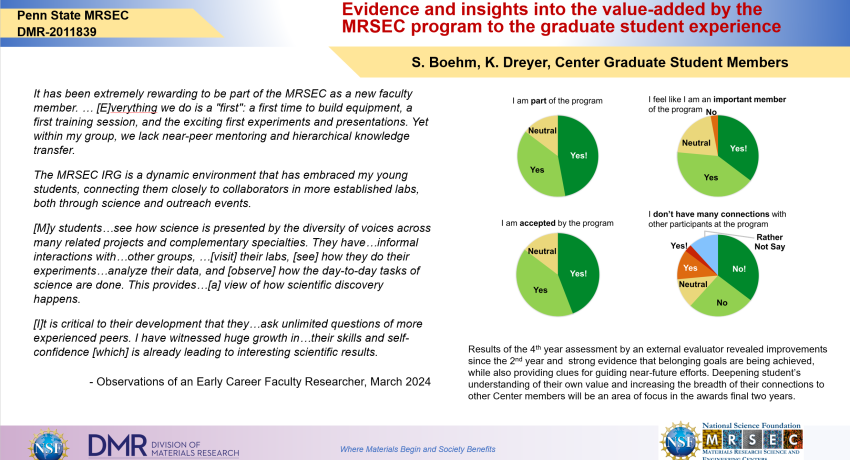What Has Been Achieved: Measuring the value-added by a MRSEC to the graduate student experience is not a trivial metric to obtain, but its importance warrants the effort and a skilled external evaluator to capture and track the data and nuances. This effort of monitoring the graduate student experience was especially important given that the current award began during the heart of the pandemic in 2020. The evaluation effort to gauge this status at the start of the 2nd year indicated students were not yet experiencing the level of community that leadership agreed was needed to achieve the collaborative, supportive, environment students need to take full advantage of a MRSECs interdisciplinary and educational strengths. As a result, efforts were increased over the last two years to bolster connections, informed by evidence-based knowledge that “sense of belonging” factors within the academic community are meaningful indicators of retention and success.1 Center activities were implemented to bring members together for in-person research, outreach, professional development, and social reasons within and between the IRG structures. Strong attendance was achieved, and programmatic design strived for low-barrier interactions, meaningful dialogue, minds-on engagement, and group work, where all voices felt safe and encouraged to contribute. The broader materials community of Penn State was included where appropriate so that Center members could also benefit from networking with even wider audiences. The Center’s recent 4th year evaluation by the same evaluator revealed successful gains since the 2nd year assessment. New questions with deeper scrutiny captured additional insightful details that leadership and staff will use to further guide programmatic efforts over the final two years.
1 Nieuwoudt, J. E., & Pedler, M. L. (2023). Student Retention in Higher Education: Why Students Choose to Remain at University. Journal of College Student Retention: Research, Theory & Practice, 25(2), 326-349. https://doi.org/10.1177/1521025120985228
Importance of the Achievement: Results of the 2nd and 4th year evaluation efforts, which focused primarily upon the experience of Center graduate students, provided solid data for meaningful discussions between faculty leadership and educational support staff, encouraging productive idea sharing and impetus for proposed efforts to address identified areas of concern and opportunity. These discussions provided a means for faculty to contribute their own observations. One early career faculty member recognized and articulated the profound impact that the Center’s research and outreach had on her lab group, comprised of only 1st and 2nd year students when joining.
These same goals and resulting strategies for creating a strong sense of community, support, and belonging are also applied to the diversity specific programs (namely the summer bridge Graduate Research Experience and Transition to Graduate School (GREaT GradS) program and PREM partnership activities with students from North Carolina Central University), thereby expanding the impact of such efforts to audiences which are known to have retention challenges.
How is the achievement related to the IRG, and how does it help it achieve its goals? The effort to retain graduate students and build their professional skills to a level of strength that ensures their future success aligns directly with the Center’s diversity strategic plan.
Where the findings are published: External evaluation efforts were implemented for internal purposes only, and therefore no IRB approvals were obtained. Therefore, the results are not publishable.
Full Quote:
It has been extremely rewarding to be part of the MRSEC as a new faculty member. In my lab, everything we do is a "first": a first time to build equipment, a first training session, and the exciting first experiments and presentations. Yet within my group, we lack near-peer mentoring and hierarchical knowledge transfer. In contrast, the MRSEC IRG is a dynamic environment that has embraced my young students, connecting them closely to collaborators in more established labs, both through science and outreach events. At weekly MRSEC meetings, my students learn about new ideas and see how science is presented by the diversity of voices across many related projects and complementary specialties. They have lots of informal interactions with the students from other groups, including visiting their labs, seeing how they do their experiments and analyze their data, and simply observing how the day-to-day tasks of science are done. This provides them with a much larger view of how scientific discovery happens, and it is critical to their development that they are able to ask unlimited questions of more experienced peers. In a short time, I have witnessed huge growth in both their skills and self-confidence. This is already leading to interesting scientific results and will serve them well as they grow in their scientific careers.
- Observations of an Early Career Faculty Researcher, March 2024


